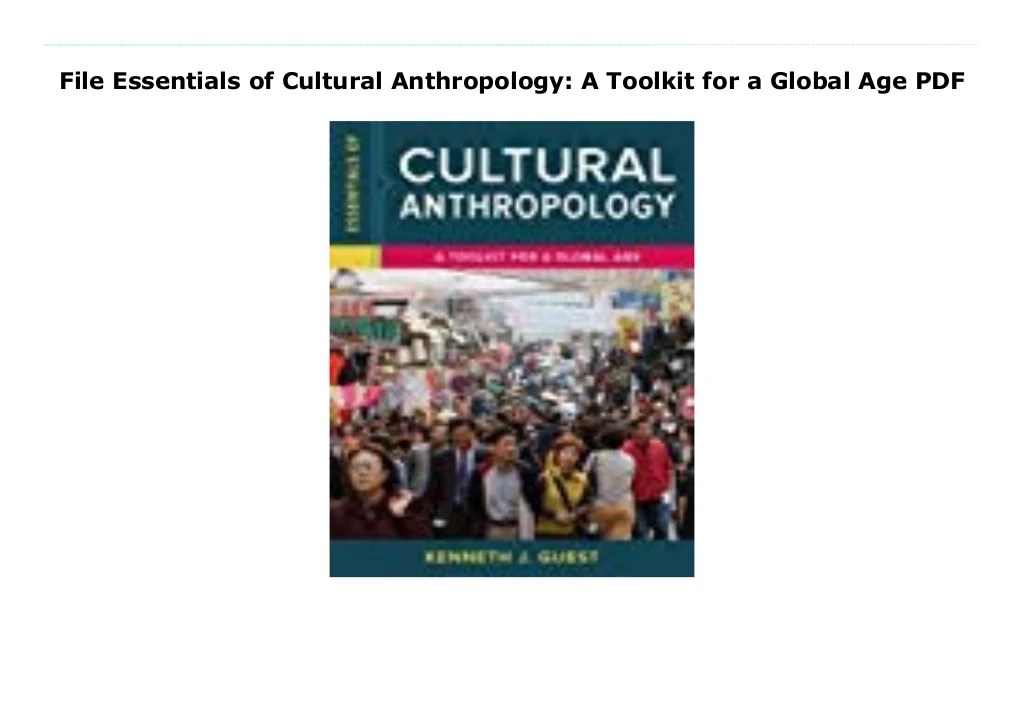Cultural anthropology a toolkit for a global age pdf – Delving into “Cultural Anthropology: A Toolkit for a Global Age,” this exploration immerses readers in a compelling narrative, with an authoritative tone that engages and provokes thought from the outset. This comprehensive guide unveils the significance of cultural anthropology in comprehending the interconnectedness of our globalized world, providing invaluable insights for navigating cross-cultural interactions and addressing global challenges.
Cultural anthropology empowers us to understand the complexities of human societies, unraveling the intricate tapestry of beliefs, values, and practices that shape our diverse world. By adopting an ethnographic approach, anthropologists immerse themselves in the communities they study, observing, interviewing, and engaging with individuals to gain firsthand insights into their cultural perspectives.
Cultural Anthropology in the Global Age: Cultural Anthropology A Toolkit For A Global Age Pdf

Cultural anthropology has become increasingly significant in understanding the interconnectedness of the globalized world. It provides a framework for navigating cross-cultural interactions and challenges, promoting cultural diversity and inclusivity.
Anthropologists study cultures through ethnographic research, which involves immersing themselves in communities and observing daily life. This method yields rich insights into cultural norms, values, and practices, enabling researchers to understand how different cultures operate and interact.
Methodological Approaches in Cultural Anthropology, Cultural anthropology a toolkit for a global age pdf
The ethnographic approach is central to cultural anthropology. It involves:
- Participant observation: Researchers live among the people they study, observing and participating in their daily activities.
- Interviewing: Anthropologists conduct structured and unstructured interviews to gather information from individuals and groups.
- Document analysis: Researchers examine written and visual materials to understand cultural history and practices.
Ethical considerations are paramount in anthropological research, including informed consent, confidentiality, and respect for cultural norms.
Key Concepts and Theories in Cultural Anthropology
Key concepts in cultural anthropology include:
- Culture: The shared beliefs, values, norms, and practices of a group of people.
- Society: The organized structure of social relationships and institutions within a culture.
- Cultural relativism: The principle that cultural practices should be understood in their own cultural context.
Major theoretical perspectives in cultural anthropology include:
- Structuralism: Emphasizes the underlying structures that shape cultural practices.
- Functionalism: Focuses on the functions that cultural practices serve for a society.
- Cultural materialism: Views culture as a product of economic and environmental factors.
Applications of Cultural Anthropology in Global Issues
Cultural anthropology plays a vital role in addressing global challenges such as:
- Migration: Anthropologists study the cultural factors that influence migration patterns and the experiences of migrants in new societies.
- Climate change: Cultural anthropologists examine the cultural dimensions of climate change, including its impact on communities and the role of cultural practices in adaptation.
- Economic inequality: Anthropologists analyze the cultural factors that contribute to economic disparities and the impact of inequality on different social groups.
By providing insights into cultural diversity and cross-cultural interactions, cultural anthropology helps policymakers and decision-makers develop culturally sensitive and effective solutions to global problems.
User Queries
What is the significance of cultural anthropology in the global age?
Cultural anthropology provides a framework for understanding the interconnectedness of global communities, enabling us to navigate cross-cultural interactions, promote diversity, and address global challenges effectively.
How does cultural anthropology contribute to addressing global issues?
Cultural anthropological research informs policymaking and decision-making on global challenges such as migration, climate change, and economic inequality, fostering culturally sensitive and cross-culturally informed solutions.
What are the key concepts in cultural anthropology?
Core concepts include culture, society, and cultural relativism, providing a foundation for understanding the diversity of human experiences and perspectives.